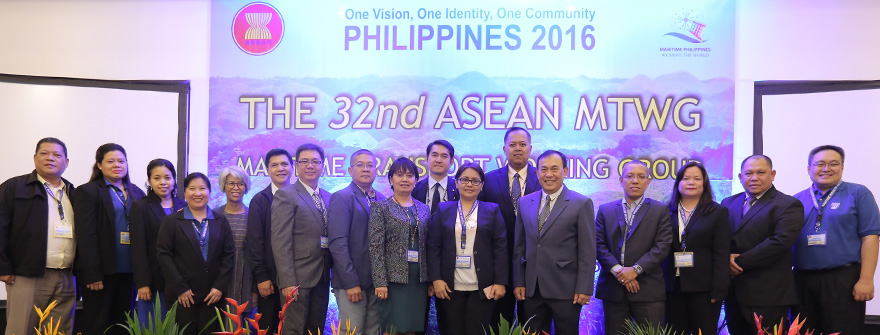Fellows' Works & Activities
The 32nd ASEAN Maritime Transport Working Group Meeting in Bohol, Philippines
The Philippines hosted the 32nd ASEAN Maritime Transport Working Group Meeting (MTWG) on the island of Panglao, Bohol, Philippines from October 18-20, 2016. Composed of ten nations, the delegates from the Association of Southeast Asian Nations (ASEAN) flocked to the island to deliberate on the agenda of enhanced connectivity and interdependence on the opening of the maritime highways within the region. Picking up from the requirements set during the 41st Senior Transport Officials Meeting (STOM), the 21st ASEAN Transport Ministers (ATM) Meeting, and other ASEAN coordinating bodies, follow-through actions on some agenda items include: the establishment of a single shipping market, current arrangements for Standards of Training, Certification and Watchkeeping for Seafarers (STCW) on near coastal voyages, implementation of the Master Plan and Feasibility Study on the establishment of the ASEAN RO-RO (roll-on/roll-off) Shipping Network and Short Sea Shipping, enhancement of maritime safety for the establishment of efficient shipping routes, formulation and implementation of ASEAN Oil Spill Response Action Plan, sustainable ports development, maritime transport agreement with India, ASEAN-Japan Cruise Promotion Strategy, Implementation of the Electronic Data Interchange in ASEAN ports, Development Study for Inland Improvement with Cambodia, Lao PDR, Myanmar and Viet Nam (CLMV) and Thailand, improvement of the linkage in the Mekong Region and the approval of the MTWG Work Plan.
The meeting was chaired by the Maritime Industry Authority (MARINA) Administrator, Marcial Q.C. Amaro III, Ph.D., and co-chaired by Mr. Benjamin Wong, Deputy Director of the Singapore Maritime Ports Authority (MPA). The Philippines shall host two more MTWG meetings in April and September/October of 2017, within an interval of six months.
Along with the delegates from the ten ASEAN Member States were staff members of the ASEAN Secretariat, Observers from the Federation of ASEAN Shipowners’ Association (FASA), the International Maritime Organization (IMO), as well as Global Initiative for South East Asia (GISEA) and dialogue partners from China, India, Japan, and the Republic of Korea. Other groups, such as the ASEAN Port Association (APA), FASA, Deutsche Gesellschaft fur Internationale Zusammernarbeit (GIZ), IMO, and the IMO-Global Initiative for Southeast Asia (GISEA), coordinated and came up with strategic plans, policies, and best practice systems.
As shown in the photo above, graduates of the World Maritime University (WMU) and the IMO International Maritime Law Institute (IMLI), who were mostly funded by The Nippon Foundation and the Sasakawa Fellowship, attended the meeting as representatives of their respective countries or forming part of the Philippine Secretariat (Organizing Committee).
Jean Pia
Philippines, 2003
The meeting was chaired by the Maritime Industry Authority (MARINA) Administrator, Marcial Q.C. Amaro III, Ph.D., and co-chaired by Mr. Benjamin Wong, Deputy Director of the Singapore Maritime Ports Authority (MPA). The Philippines shall host two more MTWG meetings in April and September/October of 2017, within an interval of six months.
Along with the delegates from the ten ASEAN Member States were staff members of the ASEAN Secretariat, Observers from the Federation of ASEAN Shipowners’ Association (FASA), the International Maritime Organization (IMO), as well as Global Initiative for South East Asia (GISEA) and dialogue partners from China, India, Japan, and the Republic of Korea. Other groups, such as the ASEAN Port Association (APA), FASA, Deutsche Gesellschaft fur Internationale Zusammernarbeit (GIZ), IMO, and the IMO-Global Initiative for Southeast Asia (GISEA), coordinated and came up with strategic plans, policies, and best practice systems.
As shown in the photo above, graduates of the World Maritime University (WMU) and the IMO International Maritime Law Institute (IMLI), who were mostly funded by The Nippon Foundation and the Sasakawa Fellowship, attended the meeting as representatives of their respective countries or forming part of the Philippine Secretariat (Organizing Committee).
Jean Pia
Philippines, 2003
